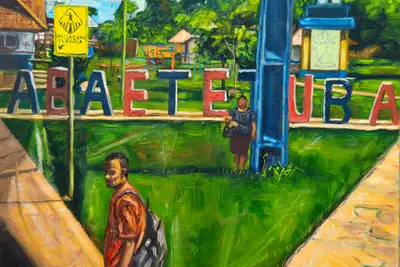Oriximiná Regional Hospital Reinforces Humanized Care for ICU Patients
The action reinforces the importance of Hospital Day with an initiative focused on the physical and emotional well-being of hospitalized patients

On Hospital Day, celebrated on July 2, the Oriximiná Menino Jesus Regional Hospital (HRMJ), in western Pará, promoted a symbolic and transformative action: it took patients from the Intensive Care Unit (ICU) to sunbathe. The activity, simple at first glance, has been gaining recognition for its positive effects on the hospital recovery process.
The highlight of the action was patient Leila Maria Portilho de Souza, 33, who had been hospitalized for 12 days. In her first exposure to the outdoors since her hospitalization, Leila celebrated not only the contact with nature but also her discharge from the ICU. "I had been in a room for twelve days. Sunbathing, having this contact with nature, is good for health. It is important for our lives. Today I will be discharged from the ICU," she celebrated.
According to specialists, sunlight plays an important role in the recovery of critically ill patients. Intensive care physician Mariana Sarmento highlights the benefits of morning sun exposure, especially in the production of vitamin D and the improvement of the immune system.
"This activity is fundamental. Patients spend a lot of time bedridden, lose muscle strength, and have lower immunity. Morning sun helps activate vitamin D3 (its active form), which in turn helps the body and also contributes to reducing stress and psychological changes such as delirium and depression," she explains.

In addition to the physical effects, sunbathing also has a direct impact on the emotional well-being of hospitalized patients. Psychologist Marcione Almeida, a member of the HRMJ multidisciplinary team, explains that prolonged hospitalization can lead to cognitive and emotional disturbances, such as insomnia and delirium.
"Sun exposure and contact with natural environments increase the production of serotonin, the so-called happiness hormone, and significantly improve the emotional state of patients, increasing their collaboration with treatment," she states.
Reference in public health in the region
With only nine months of operation, the Oriximiná Regional Hospital has already established itself as an important reference in public health in the western Pará region. The unit is exclusively dedicated to care through the Unified Health System (SUS) and has 26 inpatient and ICU beds, in addition to 16 beds for initial care.
The hospital also stands out for its comprehensive care model, with a multidisciplinary team composed of nursing, pharmacy, physiotherapy, nutrition, psychology, and social service professionals. The proposal is clear: to offer technical care with human sensitivity, even in high-complexity contexts.
Text by Uéliton Martins / communication analyst









